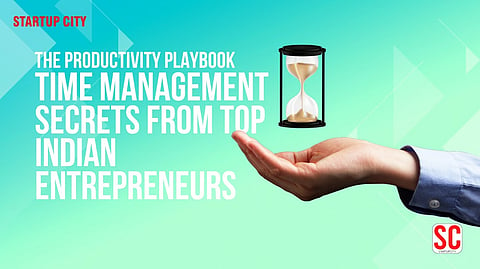

Imagine this: You wake up with a calendar full of investor meetings, team standups, strategy reviews, and customer calls. Your to-do list seems to grow by the minute. Sound familiar?
If you're a startup founder or entrepreneur, time is not just money — it's everything. And yet, some Indian entrepreneurs seem to bend time to their will. How do they do it?
Let me show you how.
I've spent years observing, interviewing, and learning from some of the most successful Indian startup leaders — from Narayana Murthy to Nithin Kamath, from Falguni Nayar to Kunal Shah. Each of them has a unique time management playbook — a set of principles, habits, and hacks that help them get more done in less time without burning out.
And today, I’m going to share it with you.
You already know this: You can’t create more hours in a day. But you can control how you use them.
“The key is in not spending time, but in investing it.”
Stephen R. Covey
In my experience, the entrepreneurs who win big are not the busiest ones — they’re the smartest with their time. They know how to say “no,” delegate what doesn’t matter, and protect their focus like a fortress.
If you’ve ever said “I wish I had more time,” you’re not alone. But here’s the secret: you don’t need more time. You need better systems.
Let’s dive into the time management secrets from top Indian entrepreneurs that you can steal — today.
Most successful founders protect their mornings like gold. It’s their sacred time to prime the brain, set priorities, and control the narrative.
Nithin Kamath, Founder of Zerodha, wakes up early to exercise, read, and journal before starting his workday. “It’s my way of creating mental clarity before the chaos begins,” he says.
Try this:
Block the first 90 minutes of your day for deep work or planning.
Avoid email, news, and social media in the first hour.
Do something that centers you — workout, meditation, journaling.
Hack: Use the “Power Hour” — 60 distraction-free minutes in the morning to knock off your most valuable task.
Top entrepreneurs don’t do everything. They do the right things.
Most use some version of the Eisenhower Matrix, which divides tasks into four quadrants:
Important & Urgent
Important but Not Urgent
Urgent but Not Important
Neither
Spend 10 minutes every evening or morning categorizing your tasks. Eliminate or delegate what doesn’t move the needle.
“Being busy is not the same as being productive.” — Ritesh Agarwal, Founder of OYO Rooms
Kunal Shah (Founder, CRED) is known for saying: “Great entrepreneurs don’t scale themselves; they scale systems.”
Successful founders don’t rely on willpower. They use automation, delegation, and tools that take decision fatigue out of their day.
Notion/Trello for task management
Calendly for automated scheduling
Slack for team communication
Zapier for automation
Focusmate or Pomodoro apps for deep work sprints
“Automate what you can, delegate what you can’t, and only then — do it yourself.”
Every "yes" is a "no" to something else.
Falguni Nayar, founder of Nykaa, once said in an interview: “I had to learn to say no to everything that wasn’t aligned with my goals — from unnecessary meetings to social obligations.”
What are you saying “yes” to that’s draining your focus?
Are your meetings value-driven or just status updates?
Pro Tip: Block “No Meeting Days” in your calendar once a week.
Time blocking is when you assign a specific time slot for every major task. No multitasking. No context switching.
Narayana Murthy, Co-founder of Infosys, followed a rigid calendar early in his career. He would schedule even thinking time.
Plan your day in 30-90 minute time blocks
Group similar tasks together (e.g., calls, emails)
Add buffer time between meetings
Your calendar is your most honest reflection. If it doesn’t align with your priorities, neither will your results.
Top entrepreneurs are not just doers — they’re reviewers. They build feedback loops into their schedules.
What did I accomplish this week?
What drained my energy?
What should I do more/less of?
What’s my #1 goal for next week?
This 30-minute habit alone can 10X your clarity and focus.
7 Productivity Apps Every Indian Founder Should Try
How India’s Top CEOs Maintain Work-Life Balance
The Psychology of High-Performing Startup Teams
Here’s the truth no one tells you: you’re not supposed to do it all.
You’re supposed to do what matters most — and do it better than anyone else.
So whether you’re building your first startup, scaling to Series A, or leading a 100-member team — remember this:
“Success doesn’t come from being busy. It comes from being brilliant with your time.”
Your time is your most limited, most powerful resource.
Use it wisely. Master it ruthlessly. Respect it endlessly.
And if you ever feel lost in the chaos, come back to this productivity playbook.
It’s built on the habits of India’s best — and now, it’s yours too.
Before you close this tab, I challenge you to:
Block your first “Power Hour” tomorrow morning.
Eliminate one task you know is just “noise.”
Comment or share your favorite productivity hack with us!
The productivity game is winnable — and you’re already ahead.